
Ferlin Eugene Husky was an American country music singer who was equally adept at honky-tonk, ballads, spoken recitations, rockabilly and pop tunes.

Ollie Imogene "Jean" Shepard, was an American country singer who was considered by many writers and authors to be one of the genre's first significant female artists. Her early successes during the 1950s decade were said to influence the future careers of Loretta Lynn, Dolly Parton and Tammy Wynette.

"Blue Eyes Crying in the Rain" is a song written by songwriter Fred Rose. First recorded by Elton Britt in 1946, then made more popular by Roy Acuff in 1947, the song has been covered by many artists, including Hank Williams Sr., Johnny Russell, Charley Pride, and Elvis Presley. Most notably, the song was recorded by Willie Nelson as part of his 1975 album Red Headed Stranger. Both the song and album revived Nelson's success as a singer and recording artist.
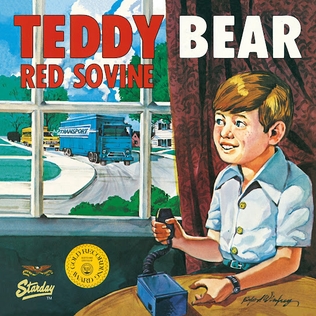
"Teddy Bear" is a song co-written and recorded by American country music singer Red Sovine. It was released in June 1976 as the title track to Sovine's album of the same name.

Dallas Frazier was an American country musician and songwriter who had success in the 1950s and 1960s.
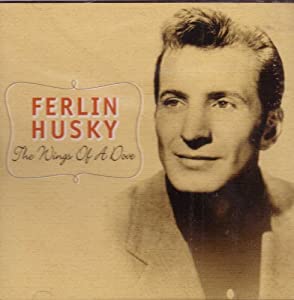
"Wings of a Dove' is a country song written by Bob Ferguson in 1958. It was popularized when it was recorded by Ferlin Husky in 1960. His recording topped the country charts for 10 nonconsecutive weeks. It was Ferlin Husky's third and final number 1 on the country chart, spending nine months on it. "Wings of a Dove" was successful on the pop charts as well, peaking at number 12 on the Hot 100. In 1987, Broadcast Music Incorporated awarded Ferguson with the "million air" plays for the "Wings of a Dove".
"Gone" is a 1957 single by Ferlin Husky written by Smokey Rogers. The song was Ferlin Husky's second No. 1 on the country chart, where it stayed at the top for ten weeks with a total of 27 weeks on the charts. The vocal backing on the song was provided by the Jordanaires with soprano Millie Kirkham. "Gone" also crossed over to the Hot 100, peaking at No. 4. Selling over one million copies, 'Gone" was awarded a gold disc.
"(Old Dogs, Children and) Watermelon Wine" is a song written and recorded by American country music artist Tom T. Hall. It was released in November 1972 as the second and final single from the album The Storyteller. The song was Hall's third number one on the U.S. country singles chart and earned him his second nomination for the Grammy Award for Best Country Song. "(Old Dogs, Children And) Watermelon Wine" spent one week at the top and a total of thirteen weeks on the chart. On June 1, 2014, Rolling Stone magazine ranked the song #93 on its list of the 100 greatest country songs.
"(My Friends Are Gonna Be) Strangers" is a song written by Liz Anderson. Best remembered as American country music artist Merle Haggard's first national Top 10 record, it was also a Top 10 song concurrently for Roy Drusky. The song is also known as All My Friends Are Gonna Be Strangers, (From Now On) All My Friends Are Gonna Be Strangers, and simply Strangers. Haggard went on to name his band the Strangers after the record's success. The song was subsequently recorded by scores of additional country stars as an album track including George Jones, Ernest Tubb, Porter Wagoner, Ferlin Husky, as well as Liz Anderson herself and Anderson's daughter Lynn Anderson.
"Forgive Me, John" is a song written by Fuzzy Owen, Jean Shepard, and Lewis Talley and was recorded by Ferlin Husky and Jean Shepard. It was released in September 1953. The song reached number 4 on the Billboard Most Played C&W in Juke Boxes chart and number 24 on the Billboard Hot 100.
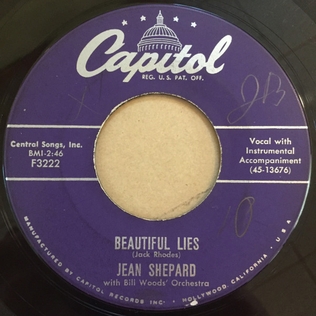
"Beautiful Lies" is a song written by Jack Rhodes and recorded by American country singer Jean Shepard. It was released in September 1955 by Capitol Records as a single. It became Shepard's fifth top ten single on the US country chart in her career and was given positive reception by critics.
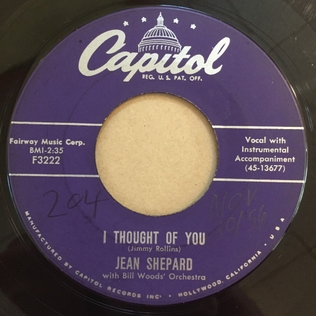
"I Thought of You" is a song composed by Jimmy Rollins that was recorded by American country singer Jean Shepard. Released as a single in 1955, it became a top ten song on the US country chart in 1955, becoming Shepard's fourth top ten recording in her career. It was given positive reviews by publications following its release.

"Second Fiddle (To an Old Guitar)" is a song written by Betty Amos that was originally recorded by American country singer Jean Shepard. It was released as a single by Capitol Records in 1964, reaching the top five of the US Country chart. The song featured Shepard yodeling and was her first top ten single in ten years. The song would later be nominated by the Grammy Awards.

"If Teardrops Were Silver" is a song written by Don Wayne that was originally recorded by American country singer Jean Shepard. It was released as a single by Capitol Records in 1966, reaching the US country top ten that year. It received positive responses from Cashbox and Record World magazines. It was included on her 1967 studio album of a Heart, We Did All That We Could.

Heartaches and Tears is a studio album by American country singer Jean Shepard. It was released by Capitol Records in March 1962 with a total of 12 tracks. The tracks mixed both new material and cover tunes. Among its new tracks was the single "How Long Does It Hurt ". It was the fourth studio album of her career and fifth overall. The album was met with positive reviews from publications.

The Best of Jean Shepard is a compilation album by American country singer Jean Shepard. It was released in September 1963 by Capitol Records and was her second compilation released in her career. The album featured 12 tracks, four of which were top ten singles on the US country chart: "A Dear John Letter", "Forgive Me, John", "A Satisfied Mind" and "Beautiful Lies". The compilation received positive reviews following its release.
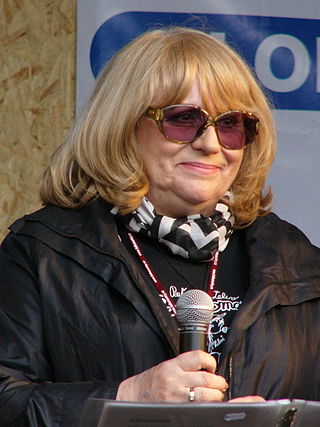
Naďa Urbánková was a Czech singer and actress.

Lighthearted and Blue is a studio album by American country singer Jean Shepard. It was released in October 1964 by Capitol Records and was her fifth studio album. It was the first studio project released following the death of Shepard's husband in a plane crash in 1963. The album was a collection of 12 cover songs that was reviewed positively by both Billboard and AllMusic. It was her first album to make the US country chart as well.

Heart to Heart is a studio album by American country singer Jean Shepard. It was released by Capitol Records in February 1968 and contained 12 tracks. The album's material mixed ballads with uptempo material. Many of the album's songs were cover tunes. Its lead single was "I Don't See How I Can Make It", a top 40 entry on the US country chart. The album received positive reviews from publications following its release. It was the eleventh studio album in Shepard's career.














